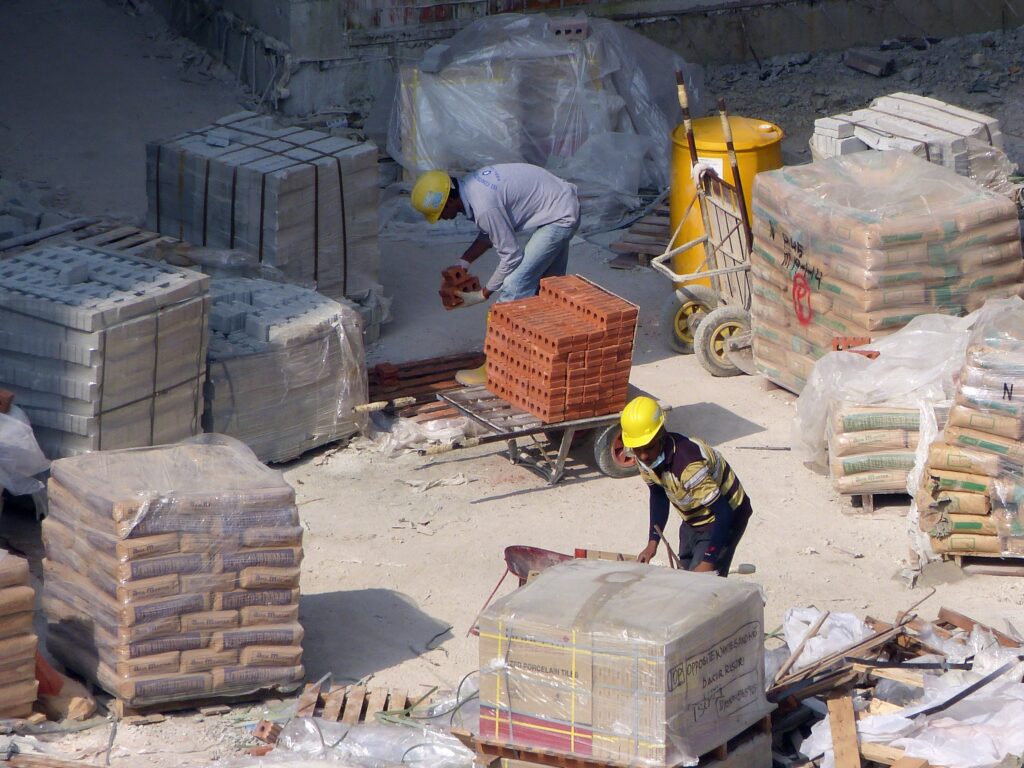
Intro
Are you considering a career in construction but wondering how much money you can make?
Look no further!
In this blog post, we’ll take a practical look at salaries for construction workers and discuss how to determine your potential income in this industry.
From entry-level positions to more experienced roles, we’ll explore how much money do construction workers make and what steps you can take to earn a high income in this field.
So let’s get started and delve into the world of construction worker salaries!

The average salary of construction workers
When it comes to determining the average salary of construction workers, it’s important to take into account several factors.
Salaries can vary depending on location, experience, and the type of construction work being performed.
In the United States, the average salary for construction workers is around $44,810 per year, according to the Bureau of Labor Statistics.
However, this figure can fluctuate depending on various factors.
For example, construction workers in cities like Los Angeles and San Francisco tend to earn higher salaries compared to those in smaller towns or rural areas.
This is largely due to the higher cost of living in these cities.
Experience is another crucial factor that can impact a construction worker’s salary.
Entry-level construction workers typically earn less than those with years of experience in the industry.
As workers gain more knowledge and expertise, they can negotiate higher salaries and earn more money.
The type of construction work being performed can also affect salaries.
Certain specialized jobs, such as electricians or plumbers, often earn higher wages due to their specialized skills and certifications.
These roles require additional training and expertise, which translates into higher pay.
Additionally, unionized construction workers often enjoy higher salaries and better benefits compared to non-unionized workers.
Union members benefit from collective bargaining agreements, which help ensure fair wages and working conditions.
This is why many construction workers choose to join unions in order to secure higher salaries and better job security.
It’s worth noting that working overtime or in challenging conditions can also lead to higher earnings for construction workers.
Overtime pay, which is typically 1.5 times the regular hourly rate, can significantly boost a worker’s income.
Additionally, jobs that require working in hazardous environments or extreme weather conditions may offer higher compensation as well.
Overall, while the average salary for construction workers in the United States is around $44,810 per year, it’s important to consider various factors that can impact individual earnings.
From location to experience, specialization, unionization, and working conditions, all these elements can contribute to a construction worker’s income.
By understanding and strategically approaching these factors, individuals can increase their earning potential within the construction industry.

Factors affecting construction workers’ salaries
If you’re considering a career in construction and want to know how much money you can make, it’s important to understand the factors that can affect construction workers’ salaries.
One of the key factors that can affect a construction worker’s salary is their level of experience.
Investing time in building your skills and gaining experience can ultimately lead to a higher income.
The type of construction work being performed can also impact salaries.
Certain specialized jobs, such as electricians or plumbers, often earn higher wages due to their specialized skills and certifications.
These roles require additional training and expertise, which translates into higher pay.
If you’re interested in pursuing a specific field within construction, it may be worth considering specializing in that area to increase your earning potential.
Unionization can also play a significant role in construction workers’ salaries.
Unionized construction workers often enjoy higher wages and better benefits compared to non-unionized workers.
Union members benefit from collective bargaining agreements, which help ensure fair wages and working conditions.
This is why many construction workers choose to join unions in order to secure higher salaries and better job security.
In addition, working overtime or in challenging conditions can lead to higher earnings for construction workers.
Overtime pay, which is typically 1.5 times the regular hourly rate, can significantly boost a worker’s income.
Additionally, jobs that require working in hazardous environments or extreme weather conditions may offer higher compensation as well.
Lastly, advancement opportunities within the construction industry can also impact salaries.
As workers progress in their careers and take on more responsibilities, they often earn higher wages.
This can include moving into management roles or becoming self-employed and taking on larger projects.

Specialization in a specific field as a construction worker
When it comes to maximizing your earning potential as a construction worker, specializing in a specific field can make a significant difference.
By honing your skills and gaining expertise in a particular area, you can set yourself apart from the competition and command higher wages.
Specialization opens the door to various opportunities within the construction industry.
Whether you choose to become an electrician, plumber, carpenter, or HVAC technician, each field offers its own set of unique skills and certifications that are in high demand.
These specialized roles often require additional training and education, which can translate into higher pay.
For example, electricians are responsible for installing and maintaining electrical systems in buildings.
With the growing demand for sustainable energy and smart technologies, skilled electricians who specialize in these areas can command higher salaries due to their specialized knowledge.
Similarly, plumbers who specialize in complex systems or green plumbing can earn more money than those who work on basic plumbing projects.
By focusing on a specific field, you also have the opportunity to build a reputation as an expert in your area of specialization.
This can lead to more job opportunities and referrals, ultimately increasing your earning potential.
Clients and employers are often willing to pay a premium for workers who possess a high level of expertise and can deliver exceptional results.
Furthermore, specializing in a specific field allows you to become a go-to resource for other construction professionals.
Contractors, architects, and project managers often rely on specialized workers for their unique skills and knowledge.
As a result, you may have the opportunity to work on more prestigious and high-paying projects.
It’s important to note that specializing in a specific field requires continuous learning and staying up-to-date with the latest industry trends and advancements.
Investing in further education and certifications can help you stay competitive and ensure that you are at the forefront of your chosen field.

The benefits of becoming a unionized construction worker
When it comes to working in the construction industry, there are many benefits to becoming a unionized construction worker.
Joining a union can provide you with higher wages, better benefits, and increased job security.
Let’s explore some of the key advantages of being a union member in the construction field.
First and foremost, one of the biggest benefits of joining a union as a construction worker is the ability to negotiate for fair wages.
Unionized construction workers often earn higher salaries compared to their non-union counterparts.
This is because unions engage in collective bargaining agreements with employers, which helps ensure that workers receive fair compensation for their skills and expertise.
Union members have a say in determining their wages, benefits, and working conditions, creating a more equitable work environment.
In addition to higher wages, unionized construction workers typically receive better benefits.
These benefits can include health insurance, retirement plans, paid time off, and job security.
Unions negotiate with employers to provide comprehensive benefits packages that support workers’ well-being and provide a safety net for unexpected situations.
Having access to quality healthcare and retirement savings plans can greatly enhance the overall quality of life for construction workers and their families.
Job security is another significant advantage of joining a union as a construction worker.
Unions provide representation and advocacy for their members, ensuring that they are treated fairly and protected in the workplace.
In the event of layoffs or disputes, unions can step in to protect workers’ rights and fight for their jobs.
This level of support and representation provides peace of mind and stability in an industry that can be prone to fluctuations.
Furthermore, unions offer valuable training and educational opportunities for their members.
They invest in the professional development of construction workers, providing access to apprenticeship programs and ongoing training to enhance skills and promote career advancement.
This commitment to continuous learning helps unionized construction workers stay current with industry trends and advancements, making them more marketable and increasing their earning potential.

Working overtime and/or working in challenging conditions as a way to earn more money
If you’re looking to boost your income as a construction worker, there are a couple of strategies you can consider: working overtime and taking on jobs in challenging conditions.
While these options may require some additional effort and dedication, they can significantly increase your earnings.
First, let’s talk about working overtime.
Many construction projects require workers to put in extra hours, especially when deadlines are approaching or unexpected issues arise.
Overtime pay is typically 1.5 times your regular hourly rate, which means you can earn a higher income for the additional time you put in.
This can be a great way to boost your paycheck and increase your overall earnings.
However, it’s important to keep in mind that working overtime regularly may lead to burnout, so it’s essential to find a balance between earning more and taking care of your well-being.
Another way to earn more money as a construction worker is by taking on jobs in challenging conditions.
This can include working in hazardous environments or extreme weather conditions.
While these types of jobs may require additional precautions and safety measures, they often come with higher compensation.
Employers understand the risks involved in these jobs and are willing to pay more to ensure the work gets done.
Additionally, jobs in challenging conditions may also require specialized skills or certifications, which can further increase your earning potential.
It’s important to note that working overtime and taking on challenging jobs may not be suitable for everyone.
It’s essential to assess your own capabilities and limitations and ensure that you’re physically and mentally prepared for the demands that come with these opportunities.
Additionally, always prioritize your safety and well-being above earning more money.
It’s crucial to work in an environment that values your health and provides the necessary safety measures to protect you.

Advancement opportunities within the construction industry
As a construction worker, it’s important to recognize that there are numerous advancement opportunities within the industry that can lead to higher salaries and increased earning potential.
By taking proactive steps and seizing these opportunities, you can elevate your career and achieve financial success.
One way to advance within the construction industry is by pursuing management positions.
As you gain experience and demonstrate your leadership abilities, you may be given the opportunity to oversee projects, supervise teams, and make critical decisions.
Moving into a management role not only allows you to have a greater impact on the construction process but also often comes with higher compensation.
Management positions require a strong understanding of project management, budgeting, and communication skills.
By developing these skills and seeking out opportunities for growth, you can position yourself for advancement within the industry.
Another avenue for advancement is becoming self-employed or starting your own construction business.
This option offers the potential for higher income as you have more control over the projects you take on and the rates you charge.
Being self-employed allows you to build your reputation, establish a network of clients, and take on larger and more profitable projects.
However, it’s important to note that starting a business comes with additional responsibilities and risks.
It requires strong business acumen, marketing skills, and the ability to manage finances effectively.
It may be beneficial to seek guidance and advice from experienced entrepreneurs or consider pursuing a small business course to equip yourself with the necessary skills and knowledge.
Continuous learning and professional development also play a vital role in advancing within the construction industry.
Staying up-to-date with the latest technologies, building codes, and construction methods can make you more valuable to employers and clients alike.
By attending workshops, earning certifications, and participating in industry associations, you can demonstrate your commitment to excellence and position yourself as a trusted expert in your field.
This, in turn, can open doors to more lucrative opportunities and increase your earning potential.
Remember, advancement opportunities within the construction industry are not limited to just these examples.
As the industry continues to evolve, new roles and specialties emerge, offering fresh opportunities for growth and higher salaries.
Stay curious, be adaptable, and always be open to learning and exploring new avenues.
By seizing these opportunities and continuously investing in your skills and knowledge, you can navigate a successful and rewarding career in the construction industry.
